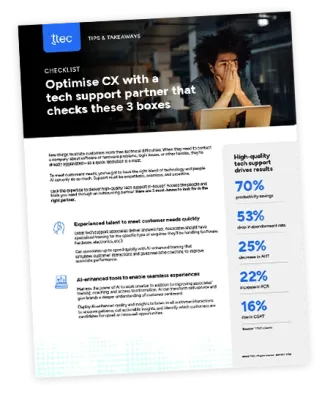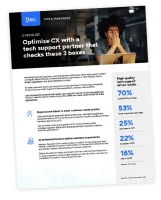Nothing frustrates customers more than getting stuck in an endless automation loop when trying to reach customer support. We’ve all been there: yelling “operator” into the phone, wasting time, and getting more annoyed every second. It’s an awful experience, and a mistake growing companies can’t afford to make.
Since most customers still prefer to reach brands by phone and 52% of customers will switch to a company’s competitor after just one bad experience, your voice channel needs to be optimised from the outset. Intelligent automation and AI can help.
The old days of directing callers through a long maze of menus with “press 1” or “press 2” are over. Modern voice automation solutions can quickly resolve more than 100 common inquiries without needing an associate. They also can seamlessly hand customers off to a human for more nuanced help when needed.
Growing companies usually don’t have a large budget to devote to automation, but investing in voice automation can save significant money, time, and hassles down the road – and benefit customers and associates alike.
Automation brings efficiency and cost savings
The real value of voice automation is that it can easily handle many Tier 1 interactions. Focus automation efforts on routine and repetitive tasks: things like account balance checks, order tracking, cancellations, warranties, and exchanges.
With simple tasks deflected to automation, you’ll free up your associates to focus on more complex interactions where they’ll add more value.
Another great benefit of automation is its capacity to enable and empower associates, so they can get the information they need more quickly, helping to reduce wait times and improve customer satisfaction (CSAT).
Back-office support and knowledge base access are areas ripe for automation that will improve associate efficiency. If AI and automation can give associates relevant customer information before they even join a call, associates will be better prepared to address customer concerns quickly and provide more personalised customer experiences (CX).
Also use automation to strengthen your associate onboarding and coaching processes. AI-powered training can improve speed-to-proficiency by letting associates simulate customer interactions and receive customised coaching in real time.
Voice support that’s 24/7 and easily scalable
Unlike associates, voice automation systems can operate around the clock so your brand can give customers access to basic information and support any time of day or night.
This ensures customers can get the answers they need, when they need them, even when associates are unavailable. The results? Better CSAT and improved customer loyalty.
Automation is also easy to scale when the specific needs of your business change. During seasonal surges or other peaks, voice automation can quickly ramp up to handle high call volumes (without requiring additional associates).
And it can just as easily scale back down. It gives you the flexibility you need to meet your evolving needs in an efficient and cost-effective way.
Actionable insights to inform decision making
Voice automation systems can gather a wide array of data from customer interactions – more reliably and with greater scale than human associates can – which gives brands better insights into customer behavior and trends.
Use this wealth of data to identify patterns and friction points in the customer journey. What are the top reasons customers are calling the contact centre? What delights them? What frustrates them? Data can tell you all these things.
Contact centre managers should use these types of insights to improve and optimise processes and enhance CX. Additionally, diving into customer data can help you craft more personalised experiences and uncover potential upsell and cross-selling opportunities.
Find voice solutions that fit your needs
The right voice automation tools can have a powerful impact on your CX and sales, but they’re not intended to replace your workforce of associates. It’s important to strike the right balance between automation and human interaction, especially since customers still prefer to speak to a person for certain types of inquiries.
A CX partner that specializes in working with growing companies can help you find the right mix of people and technology, and has proven strategies and best practices to harness your CX operation’s full potential.
















